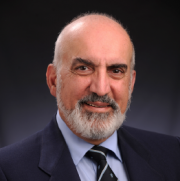My first email contact with Dr. Liz Armstrong informing her of my plight was answered with a most caring note of empathy and reassurance. I was not to worry if I did not make it to the course she said, with provision made for coming the following year if required, fees intact. Could I manage it at all I asked myself? Everything was in place, funeral over, dues paid, flight and hotel booked, and rather than mope in my understandable moment of grief, I decided to go. It was one of the better decisions of my year.
Meeting Liz Armstrong for the first time, I felt a sense of presence from the outset. Later joined by Clay Christensen, Thomas Aretz, Connie Bowe, Sue Farrell and other faculty, a new world unraveled for me. While some moments were a blur, others were needle sharp. I was totally immersed in the Leading Innovations course in distraction, and it was the cure for mourning. Be practical. Life goes on regardless.
I made up my mind swiftly to return for another course in 2010 but I was pre-empted by being invited back as alumni faculty for the same program. Then I met Myra Hunt, coaching me in small group sessions with her dulcet Southern tones, always with enthusiasm and frequent humor. The seeds of wanting to pursue a Master’s degree were sown, but just what area remained undetermined. Exploring the Internet for possible avenues, I found an MBA in Leadership & Sustainability from the Robert Kennedy College (RKC) in Zurich, a highly ranked on-line program with a mandatory residency. I started my degree in 2011, meeting another array of audible but unseen professors as the modules progressed. What was entirely novel was communicating with global on-line colleagues, bent on the same ambition. They came from every walk of life, young, old, professionals, CEOs, COOs – I felt in good company.
Organizational behaviour was a blast. No problems, but then oh! marketing management. I gained a new respect for marketing and realized how little I actually knew, and it was nearly the cause of my downfall as I scraped a pass. Better effort required? No, more learning required. Money and then Financial Management modules followed before I arranged my residency. RKC being on-line has to collaborate with another institution, in this case, the University of Cumbria, UK, which grants any eventual degree.
Now into 2012, no HMI course! I suffered withdrawal syndrome so went back for the HMI Educators course in 2013. Surprisingly, HMI teaching and my MBA studies dovetailed extremely well. I felt “safely in the groove” but all was to change with Bob Kegan’s arrival on the scene. Bob is a man who transfixes your attention. His infamous one-man dialogue is worthy alone for attendance on the course, and he is faculty at Harvard Business School. Inspired with memorable instruction, I subsequently bought two of his books – “In over our heads – the mental demands of modern life” and “How the way we talk can change the way we work.” I strongly recommend both.
Were there downsides? Yes, fatigue from full-time work commitments, time away from family, all spare time appearing to vanish, and substantial bills to pay. Such courses are not cheap and can cost up to $50 to 60 thousand, some as much as $100 thousand. My dues were quite modest in comparison after careful choice of institution. 2014 was a fallow year for me but it did not take long to return to Boston. Meanwhile, I completed my residency in Cumbria, UK, and met another group of candidates for Leadership and Sustainability and completed Strategic Management, a course one could not take until after residency. We are all in still in touch with email today, almost lifelong friends.
I returned to Boston for the Systems Approach to Assessment course in 2015 where I met Lou Pangano, another most extraordinary person at the HMI, known to sing out loud when occasion permits. I was in the final strait of my MBA, with just my dissertation to go. This is a place where many get stuck, and I did too. What was the question I wanted to ask and seek and to answer in my research? A good literature review is vital, and worth spending considerable time to extract precisely. Methodology, results, discussion, and conclusion – all need specific skills to complete with diligence and here I found HMI had provided. New skills were learned – performing regression analysis myself, narrative analysis from focus groups using NVIVO, compiling references, adding appendices, tables, graphs, diagrams, all into a professional format without frills.
So health is not only about health - it is about business, and philosophy, and really about clinical outcomes in the end. Completing my MBA dissertation enabled a belated balancing of my profession, by understanding the business aspect of health, as well as human behavioral patterns and superior management systems. Physicians are often assumed to have such knowledge but the truth is that we often learn about or garner business information on the run. The reins of a medical career were gathered up effectively, with drive and renewed discipline, and delivered desired fulfilment. I wish I had planted seeds twenty years earlier, but “better late than never.”
The dissertation presented, I returned to Boston once more in 2016 as alumni faculty in the Systems course. My successful MBA result was just a bit too late to celebrate at the course, but I owe it all to HMI. How many of you have been similarly motivated to advance your learning after participation in an HMI course? Comment on my blog if so!
Mohamud A Verjee

Mohamud A. Verjee, BSc(Hons), MBChB, MBA(LS), DRCOG, CCFP, FCFP - Moving to Oxford after qualifying at the University of Dundee, Dr Verjee spent 16 years practicing general medicine but wanted more. He then moved to Eastern Canada and two years there propelled his career at the University of Calgary from 1996. In 2007, an opportunity to lead family medicine as the inaugural primary care director at Weill Cornell’s branch campus in Doha, Qatar, revealed more academic horizons. The rest, in his words, is history.

